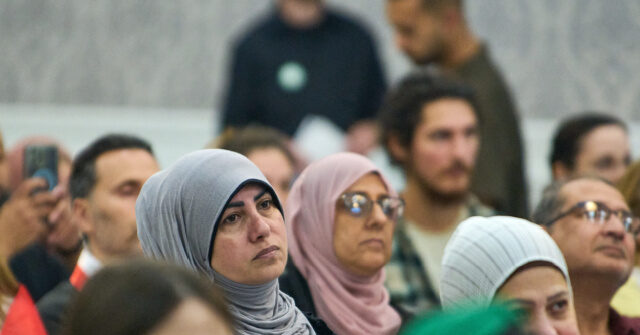In a recent incident that highlights the growing rift between the Democratic Party and Muslim Americans, Ahmed Ghanim, a Muslim-American Democrat and former Congressional candidate, was ejected from a rally for Vice President Kamala Harris in Royal Oak, Michigan. Ghanim took to social media platform X to share his experience, describing how he was removed from the venue without given a reason despite having gone through security and being assigned a seat. This shocking occurrence has added to the prevailing tensions between the Democratic Party and the Muslim American community, with Ghanim drawing parallels to the treatment of Muslims at rallies led by former President Donald Trump in 2016. He pointed out that while he faced ejection from Harris’s event, Trump was simultaneously engaging with Muslim leaders, further reinforcing the sense of alienation felt by some in the community under the current administration.
In his recounting of the events, Ghanim expressed his disbelief at being targeted for removal, insisting he had not done anything to warrant such action. Despite being dressed casually and blending in with the crowd, he found himself singled out among the approximately 200 attendees. Ghanim described the situation as a clear case of racial profiling, arguing that the removal was based solely on his Muslim identity. He noted that the nature of the Democratic rally today mirrored the experiences many Muslims had during Trump’s campaign, where they frequently faced hostility and were ejected based on their faith. His assertion underscores a troubling trend in political gatherings where Muslim Americans feel unwelcome or threatened by party affiliations that are ostensibly meant to be inclusive.
In response to the incident, the Harris campaign issued a statement regretting Ghanim’s removal and emphasizing their commitment to the Muslim American community. They expressed their desire to maintain a welcoming environment, inviting Ghanim to attend future events. This acknowledgment from the campaign could be seen as an attempt to mend fences with a demographic that has shown increasing discontent with the Democratic Party’s approach to issues affecting the Muslim community, particularly in the context of foreign policy and domestic issues related to civil liberties. However, the fact that such actions are necessary signals a deeper issue that needs to be addressed if the Democrats wish to keep the support of Muslim Americans.
Meanwhile, the political landscape is shifting as some Arab Americans express growing support for Donald Trump, citing dissatisfaction with the Biden administration’s handling of conflicts, particularly the ongoing war between Israel and Hamas. Trump has successfully garnered support from notable Arab American figures, including Hamtramck Mayor Ameer Ghalib, who has publicly endorsed the former president, emphasizing that Trump represents a viable alternative during critical times. This has forced the Democratic Party to confront potential electoral repercussions as they notice an erosion of support among Arab American voters who feel disillusioned by their party’s current nefarious dealings around sensitive issues.
Polls reveal a nearly even split in support between Trump and Harris among Arab Americans, with a slight edge for the former president. According to an Arab News/YouGov poll, 45 percent of Arab Americans expressed support for Trump, contrasted with 43 percent who preferred Harris. Alarmingly, these sentiments extend into views on conflict resolution, where a substantial number perceive a Trump-led administration as being more capable of addressing longstanding tensions between Israel and Palestine. The perception that Trump could better navigate these complexities is indicative of broader frustrations surrounding the current administration’s foreign policy decisions, which have, in some cases, sidelined the concerns of Muslim Americans.
As events unfold, the Democratic Party finds itself in a precarious position. The heightened tensions underscore not only a need for introspection regarding outreach efforts to the Muslim community but also reflect serious questions around political alignment during a time filled with geopolitical turmoil. For many Muslims and Arab Americans, the feeling of marginalization within political rallies and public discourse has fueled a sense of urgency for reevaluation of their political affiliations. As Ghanim’s experiences highlight, the Democratic Party must work diligently to repair and reaffirm its commitment to inclusivity and representation if it aims to retain and grow its support among Muslim Americans, especially amidst a concerted effort by the GOP to win them over.
Ultimately, the ejection of Ghanim from Harris’s rally serves as a critical reminder of the pressures within political alignment and the complex dynamics at play within the Democratic Party’s relationship with Muslim Americans. Moving forward, the party’s ability to reflect upon and address these challenges will play a pivotal role in shaping its electoral prospects and its overall relationship with a community that, despite feeling sidelined, remains vital to the fabric of American democracy. Political endorsements and community outreach are not merely tools to garner votes; they demand genuine discourse and an understanding of the nuances that define the experiences of Muslim Americans today. As political landscapes continue to evolve, leaders must navigate these intersections with sensitivity and urgency, lest they further alienate an increasingly pivotal voter demographic.

